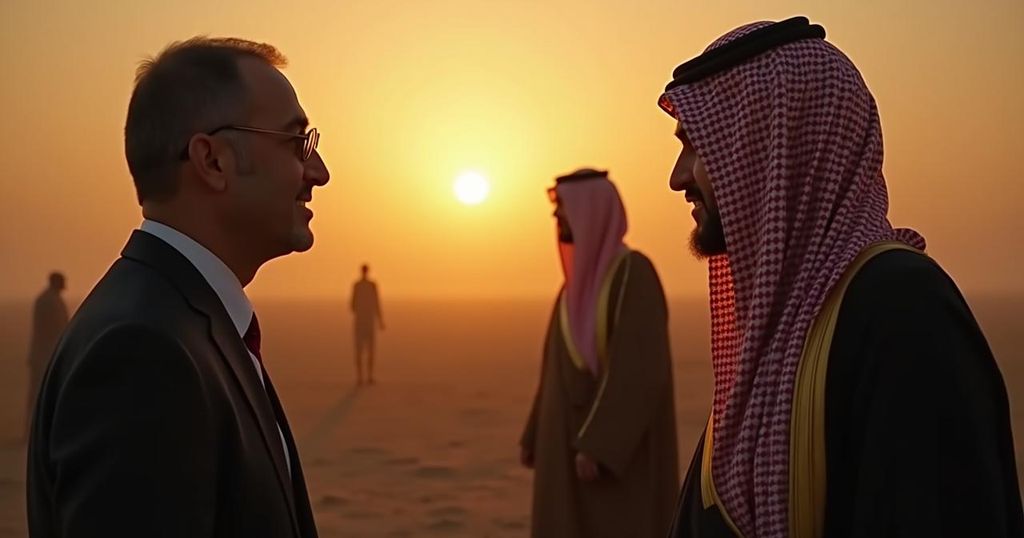Recent developments have dimmed the likelihood of a Saudi-Israeli rapprochement following the Iranian Foreign Minister’s visit to Saudi Arabia. This visit aims to fortify regional solidarity against Israel’s military actions while also demanding attention to Palestinian statehood. The evolving geopolitical dynamics complicate the previous momentum towards normalization, reflecting the nuanced interplay of regional and international politics.
The outlook for a diplomatic agreement between Saudi Arabia and Israel has significantly diminished following the visit of Iranian Foreign Minister Abbas Araghchi to the Kingdom. This visit aims to address concerns related to Israel’s actions in Gaza and Lebanon, signaling a shift in regional dynamics. Minister Araghchi stated, “Our dialogue continues regarding the developments in the region to prevent the shameless crimes of the Zionist regime in Lebanon, in continuation of the crimes in Gaza.” His remarks underline Iran’s intent to foster collective regional efforts to counter perceived Israeli aggression. Historically, Saudi Arabia has maintained a strong alliance with the United States, being its foremost arms purchaser, yet, in recent years, it has exhibited signs of rapprochement with Iran. This evolving political landscape is highlighted by Saudi Arabia and other Gulf states reaffirming their neutrality amid the ongoing conflict between Israel and Iran. Iran has issued warnings regarding the potential targeting of Gulf states’ interests should their supporters take a more direct role in the conflict. In the background, prior to the escalation resulting from the Hamas attacks on October 7, the Biden administration prioritized a normalization deal similar to the Abraham Accords, which was expected to include security guarantees and civilian nuclear cooperation between Saudi Arabia and Israel. However, the shift in the situation has prompted Saudi leaders to demand a framework for a Palestinian state as a prerequisite for any deal. Political analysts express skepticism about the likelihood of achieving such a treaty amidst current Congressional divides and the impending elections. Discussions of a possible Saudi-Israeli normalization deal have brought about various political reactions, particularly in light of critiques surrounding Saudi Arabia’s human rights practices. Former National Security Council officials, such as Robert Greenway, have expressed doubts regarding the seriousness of the Biden administration’s efforts toward the deal. Former deputy national security adviser Victoria Coates remains cautiously optimistic about the prospects of the agreement, suggesting that timing might play a crucial role in its realization. Overall, the geopolitical landscape in the Middle East is complex and rapidly evolving, illuminating challenges that hinder the pursuit of peace and normalization between Saudi Arabia and Israel in the current context.
The geopolitical landscape surrounding Saudi Arabia and Israel’s potential normalization of relations has been delicate and subject to rapid changes. Historically, Saudi Arabia has been a significant ally of the United States and has engaged in military partnerships that include substantial arms procurement. However, increasing political engagements with Iran have introduced a new dimension to their foreign relations. This shift has coincided with heightened tensions in the region, particularly involving issues related to Israel’s actions towards Palestinians and broader regional dynamics. The discourse surrounding normalization with Israel became prominent with the Biden administration’s attempts to negotiate an accord akin to the Abraham Accords, aiming to secure agreements that addressed both security guarantees and the broader implications for Palestinian statehood. As the conflict between Israel and Hamas intensified, this effort faced substantial skepticism and obstacles, reflecting the multifaceted interests and concerns of various actors in the region.
In summary, the intersection of Israel’s recent military actions, Iran’s strategic engagements with Saudi Arabia, and the shifting demands for Palestinian statehood have dramatically altered the prospects for a Saudi-Israeli normalization deal. Iranian involvement in the region reflects a growing complexity in diplomatic interactions, questioning the viability of agreements predicated on previous frameworks. The political climate in the United States further complicates the potential for such agreements, emphasizing the need for a profound reevaluation of strategies that account for both regional stability and international relations.
Original Source: www.foxnews.com







